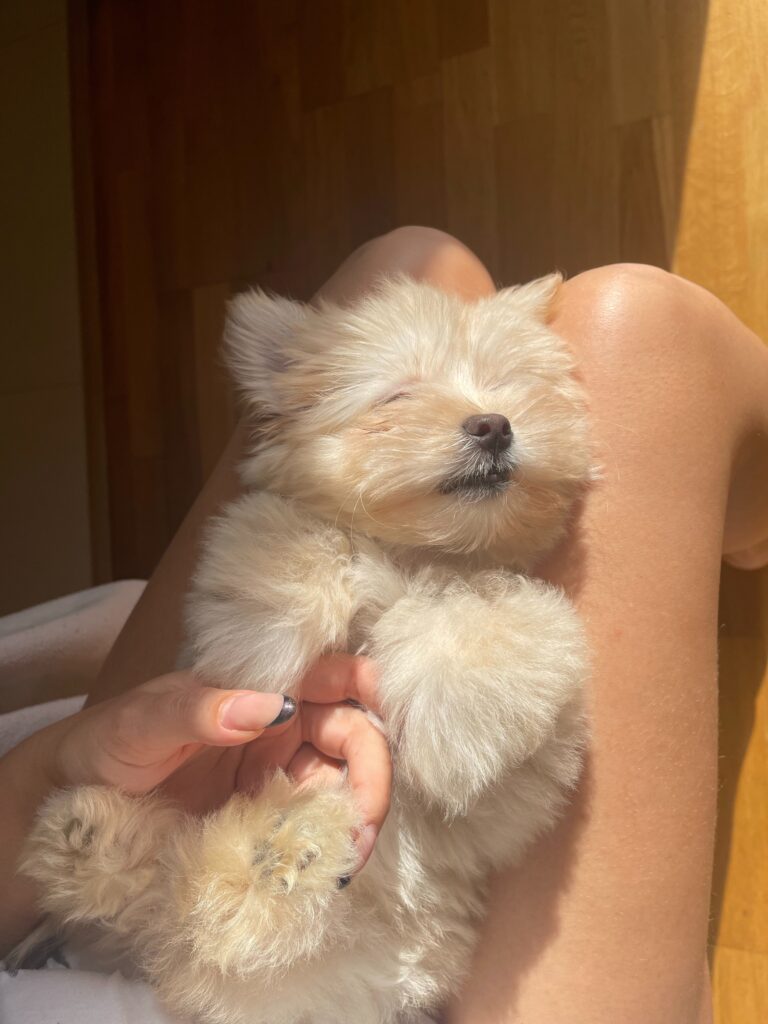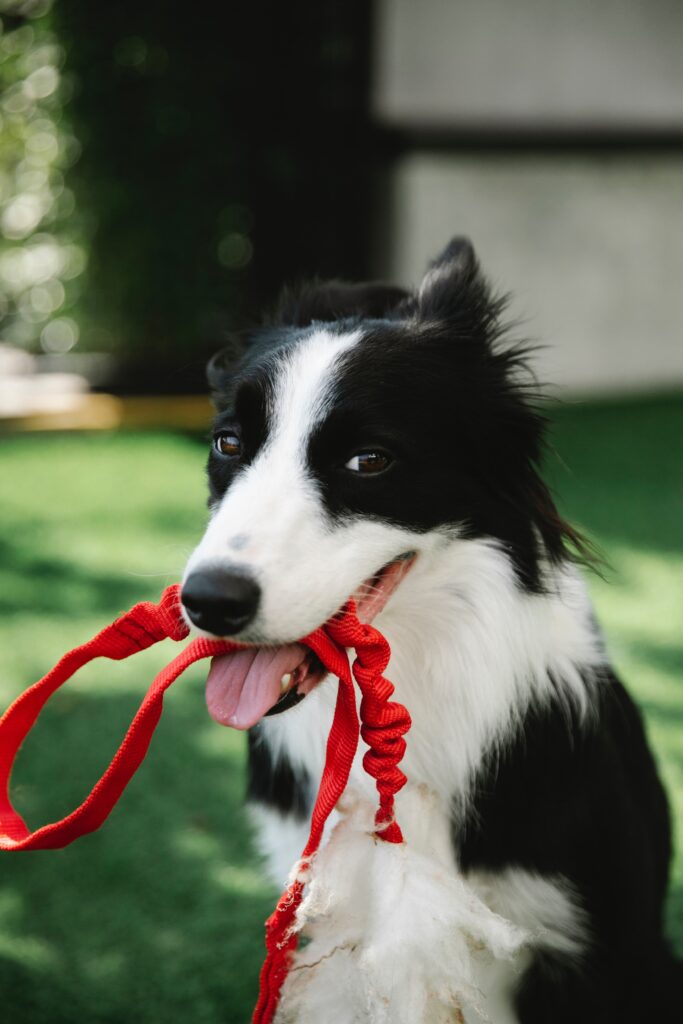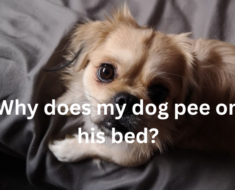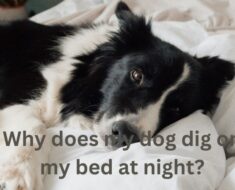Is your dog turning their bed into a chew toy? You’re not alone! Many pet owners face the challenge of dealing with a dog that loves to gnaw on its cozy sleeping spot. But worry not, as we have the perfect solution for you.
However, to prevent your dog from gnawing on its bed, try using a bitter apple spray. This natural and non-toxic solution is designed to deter dogs from chewing on various objects, including their beds.

The bitter taste of the spray discourages them from sinking their teeth into their cozy sleeping spot. Applying this spray to your dog’s bed can help break the habit of chewing and keep their sleeping area intact.
In this article, we’ll reveal a simple yet effective spray that can end your dog’s destructive chewing habits. Here look up why does your dog sneak into my bed at night?
Say goodbye to torn and tattered beds! Discover what you can spray on your dog’s bed to stop them from chewing and reclaim their sleeping area as a peaceful sanctuary.
Why Dogs Chew Their Beds?
Dogs chew for various reasons, including teething, boredom, anxiety, or simply out of habit. Chewing provides them with mental stimulation and helps alleviate discomfort or stress.
However, when it comes to their bed, it can be both inconvenient and costly. Understanding why your dog chews their bed is crucial in finding the right solution to prevent this behavior.
Understanding the Importance of Deterrent Sprays
Deterrent sprays are an effective way to discourage dogs from chewing on their beds. These sprays work by creating an unpleasant taste or smell that dogs find off-putting.
Applying a suitable spray on the dog bed can train your dog to associate their bed with an unpleasant experience, ultimately breaking the chewing habit.
Here check out how to wash Kong dog beds.
What can I spray on dog bed to stop chewing?
To deter your dog from chewing on their bed, use a bitter-tasting spray specifically designed for dogs. These sprays are typically made with safe and non-toxic ingredients that dogs find unpleasant, such as bitter apple or citrus.

By applying a thin and even layer of the spray onto the bed, it can discourage your dog from chewing on it due to the unpleasant taste.
However, it’s important to note that some dogs may still persist in chewing despite the taste.
In such cases, it’s advisable to address the underlying cause of the chewing behavior and provide appropriate chew toys or bones as an alternative.
Look up why your dog sleeps at the end of the bed?
| Image | Product | Details | Price |
|---|---|---|---|
 |
SynergyLabs Fooey! Ultra Bitter Spray; 8 fl. oz. |
Brand Fooey Item Form Spray Scent Unscented Age Range (Description) All Stages |
Check Price |
 |
EBPP Stop The Chew 3X Strength Anti Chew Bitter Spray Deterrent for Dogs and Puppies | Our anti chew spray for dogs Ease of Use and No Mess Application |
Check Price |
 |
Grannick’s Bitter Apple Taste Deterrent Spray Bottle for Dogs, | Hair Type All Material Type Free Dairy Free Liquid Volume 237 Milliliters Item Form Fluid |
Check Price |
 |
Anti Chew Dog Training Spray: No Chew Bitter Spray and Pet Deterrent for Dogs and Cats | Correct bad habits: Triple the bitterness: Safe for pets |
Check Price |
 |
Rocco & Roxie No Chew Spray for Dogs, More Yuck Than Bitter Apple |
WITH CALMING COPAIBA OIL FOR SOOTHING HOT SPOTS SAFE ON FURNITURE—GOOD FOR SKIN |
Check Price |
Types of Sprays to Stop Dog Chewing
1. Bitter Apple Spray
Bitter apple spray is a widely-used deterrent that is safe for dogs and will not harm their health. It has a strong, bitter taste that dogs dislike, making it an effective option to discourage chewing.
Simply spray the bitter apple solution on the bed, ensuring thorough coverage. The bitter taste will deter your dog from chewing; they will learn to avoid the bed altogether over time.
2. Citrus-Based Sprays
Citrus-based sprays utilize the natural aversion dogs have towards citrus smells. These sprays are easy to make at home by diluting citrus juice with water or using commercial citrus-based products.
Spray the solution onto the dog bed; the citrus scent will discourage chewing. Remember to reapply the spray periodically to maintain its effectiveness.
3. Vinegar Spray
Vinegar has a strong odor that dogs find unpleasant. Create a vinegar spray by mixing equal parts of water and white vinegar.
Spray the solution onto the dog bed, focusing on areas susceptible to chewing. The smell of vinegar will repel your dog and discourage them from chewing.
4. Cayenne Pepper Spray
Cayenne pepper spray is a potent deterrent that should be used with caution. Dogs have a sensitive sense of smell, and the strong scent of cayenne pepper can deter them from chewing.
However, ensure that the spray does not come into contact with your dog’s eyes or nose, as it may cause discomfort or irritation.
5. Homemade Remedies
Apart from the sprays mentioned above, there are various homemade remedies you can try to discourage your dog from chewing on their bed.
Some everyday household items that can be used as deterrents include:
- Lemon Juice: Dogs generally dislike the smell of citrus. Dilute lemon juice with water and spray it on the dog bed to create an undesirable scent that discourages chewing.
- Alcohol: Mix equal parts of water and rubbing alcohol and spray it on the bed. The strong smell of alcohol can deter your dog from chewing.
- Mouthwash: Some mouthwashes contain ingredients like menthol or eucalyptol, which have a strong taste and scent that dogs find unappealing. Dilute mouthwash with water and spray it on the bed as a deterrent.
- Peppermint Oil: Dogs have a natural aversion to the strong smell of peppermint. Dilute a few drops of peppermint oil with water and apply it to the dog bed to discourage chewing.
When using homemade remedies or any sprays, it’s important to consider your dog’s sensitivities and allergies. If you notice any adverse reactions or discomfort, discontinue use immediately and consult your veterinarian.
How to Apply the Sprays Effectively
To maximize the effectiveness of the sprays and ensure that your dog associates their bed with an unpleasant experience, follow these tips:
Here check out why does your dog lick your bed sheet.
1. Thoroughly clean the bed:
Before applying any spray, clean the bed to remove any odors or tastes that may attract your dog’s chewing behavior.
2. Test on a small area:
Before spraying the entire bed, test the spray on a small, inconspicuous area to ensure it doesn’t stain or damage the material.
3. Apply generously:
Spray the deterrent solution on the entire bed, focusing on areas your dog tends to chew the most.
4. Reapply as needed:
Over time, the scent or taste of the deterrent may fade. Reapply the spray periodically to maintain its effectiveness and discourage chewing behavior consistently.
5 Tips to Prevent Dog Bed Chewing
Alongside using deterrent sprays, here are some additional tips to help prevent your dog from chewing its bed: Here to put your dog bed?
1. Provide appropriate chew toys:
Ensure your dog has access to a variety of safe and durable chew toys. Encourage them to redirect their chewing behavior to the toys rather than the bed.
2. Supervise and redirect:
Keep a close eye on your dog when they are near their bed. If you catch them chewing, redirect their attention to a toy or engage them in a different activity.
3. Increase exercise and mental stimulation:
Dogs often chew out of boredom or excess energy. Make sure your dog receives regular exercise and mental stimulation through interactive playtime and training sessions.
4. Create a comfortable environment:
Ensure your dog’s bed is comfortable, appropriately sized, and meets their needs. A comfortable bed can reduce the likelihood of destructive chewing.
5. Consider crate training:
If your dog is prone to chewing when unsupervised, consider crate training. A crate provides a safe and secure space, reducing the temptation to chew on their bed.
FAQs
Can I use human deterrent sprays on my dog’s bed?
It’s best to use deterrent sprays specifically formulated for dogs. Human deterrent sprays may contain ingredients that could be harmful to your dog. Stick to pet-safe products to ensure their well-being.
How long does it take for the sprays to be effective?
The effectiveness of the sprays may vary depending on your dog’s behavior and preferences. Some dogs may be deterred after just a few applications, while others may require more time and consistency. Be patient and consistent in applying the sprays to achieve the desired results.
Can I make my own deterrent sprays at home?
Yes, homemade remedies are using natural ingredients that can serve as deterrent sprays.
However, it’s essential to research the ingredients and their potential effects on dogs before using them. Consult with your veterinarian for guidance on safe homemade solutions.
What if my dog continues to chew despite using deterrent sprays?
If your dog persists in chewing their bed despite the deterrent sprays, consulting a professional dog trainer or behaviorist may be helpful.
They can assess your dog’s behavior, provide specialized guidance, and recommend additional training techniques to address the chewing habit.
Are there any alternative solutions to prevent dog bed chewing?
Alongside using sprays, you can explore other solutions such as using bitter-tasting sprays directly on the bed, providing alternative chewing outlets like puzzle toys or frozen treats, or using deterrent mats or covers for the bed.
Finding the right combination of strategies that work for your dog is key.
Conclusion
Chewing on their bed can be a frustrating and costly behavior for dogs. However, you can effectively discourage this habit with the right approach and tools.
Using deterrent sprays, such as bitter apple spray, citrus-based sprays, vinegar spray, cayenne pepper spray, or homemade remedies, can help train your dog to avoid chewing on their bed.
Remember to follow the application tips and combine them with additional preventive measures to create a chew-free environment for your furry friend.






